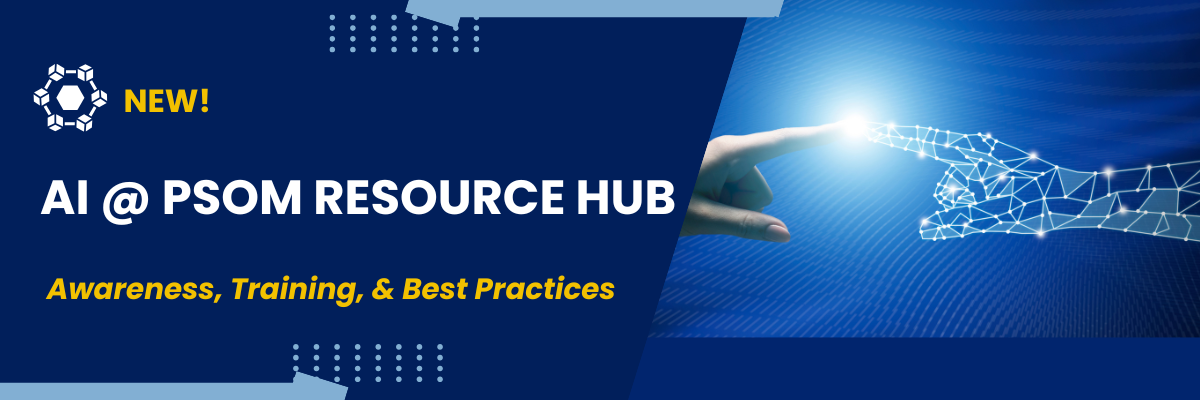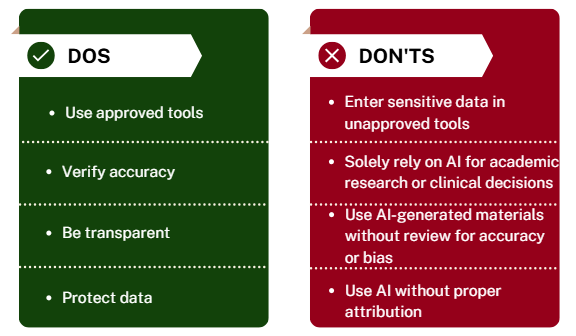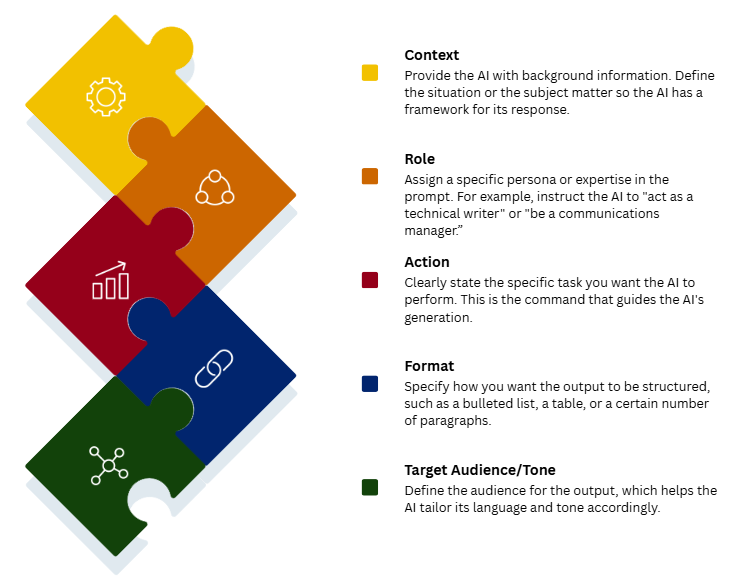AI @ PSOM

Welcome to the Perelman School of Medicine’s central resource for artificial intelligence (AI).
PSOM is integrating AI to accelerate discovery, improve medical education, streamline administrative activities, and enhance clinical care — always guided by our core values of ethics, data integrity, and patient trust.
Through responsible innovation, we aim to develop a workforce which is future ready, through the development of AI capabilities, and to:
- Improve efficiency in research and operations
- Advance precision medicine
- Support faculty, staff, and students in thoughtful, ethical AI adoption
Artificial Intelligence (AI) is transforming how we teach, learn, and conduct research at Penn. To support our community, the Perelman School of Medicine is launching an AI Resource Hub designed to provide best practices, professional development opportunities, and guidance for responsible AI use.
We invite you to take advantage of Penn’s growing network of resources to learn how to integrate AI effectively, ethically, and securely in your work.
PSOM AI Needs Analysis Survey
To help the Perelman School of Medicine better understand current needs and priorities, staff are encouraged to complete the PSOM AI Needs Analysis Survey. Your input will help inform future training, resources, and initiatives—including how AI-related learning opportunities are designed and delivered to best support your work.
Thank you in advance for taking a few minutes to share your perspective. Questions about the survey? Please contact Stephanie Thompson at srtrae@upenn.edu.
AI Best Practices @ PSOM Workshop
Grounded in adult learning models including Knowles’ Andragogy, Kolb’s Experiential Learning, and Merrill’s First Principles of Instruction, this workshop will help you:
-Review what AI is, its benefits, and potential uses.
-Understand PSOM-specific AI Do’s and Don’ts.
-Build awareness and support for responsible AI use at PSOM.
-Connect with key Penn and PSOM AI resources.
-Learn best tips and practices for querying AI effectively.
-Explore practical ways staff can use AI in their daily work.
This workshop is intended for PSOM BAs.
Register for PSOM AI Best Practices Workshop or Watch the Workshop Recording
Microsoft Copilot Training
Learn how to use Copilot effectively across the Microsoft 365 ecosystem in this practical course. Microsoft MVP Deb Ashby walks you through Copilot features in Excel, PowerPoint, Word, and Outlook—from analyzing data and building presentations to drafting and refining documents and emails to boost productivity across your workflow. This is a LinkedIn Learning training on Workday.
Enroll in the Microsoft Copilot Training
Do's & Don'ts
When using AI, the goal is responsible use—stick to approved tools, verify accuracy, be transparent, and protect data. At the same time, avoid entering sensitive information in unapproved tools, relying on AI without human judgment, or using AI-generated content without proper review and attribution.

Refer to official Penn ISC AI for guidance
C.R.A.F.T. Model
The C.R.A.F.T. model is a structured approach to prompt engineering designed to help you create effective prompts.

Prompting & Practice
Prompting in AI is the process of providing instructions, such as a question, command, or statement, to an AI model to guide it in generating a desired response. The quality of the output is directly influenced by how well the prompt is crafted, so clear, specific, and detailed prompts lead to more relevant and useful results.

Use Cases
For individual productivity, AI is especially useful for content creation, information processing, time management, and idea generation. These tools can help draft and summarize materials, organize meeting takeaways, and spark new ideas—while you remain responsible for review and final decisions. Think about the pain points in your day, how can you use AI to alleviate those.

Resources
The ISC AI Hub aims to boldly forge new pathways, relationships & solutions to accelerate campus readiness. We offer tool & training recommendations, as well as consultation along with our campus partners.
Penn embraces innovations like generative artificial intelligence (“AI”) models in teaching, learning, research, and the effective stewardship of Penn’s resources. To this end, this document provides guidelines for members of the Penn community who are using, or interested in using, AI in pursuit of Penn’s mission.
Discover how the University of Pennsylvania is pioneering the understanding and advancement of artificial intelligence research, applications, and education.
AI Hub is Penn Medicine's central resource for exploring, sharing, and advancing artificial intelligence applications in clinical care and health system operations. For more hands-on strategies to make AI work for you, join “Your AI Coach” on Tuesday, Nov. 25, 11 a.m. to 12:30 p.m. Explore real-world examples and get your questions answered by Penn Medicine’s AI experts (UPHS employees only).
Library-curated guide to AI tools (chat, research, image, etc.) and usage recommendations.
Register for free, in-person AI Professional Development Sessions! Funded by Penn’s Draw Down the Lightning Grants, Information System and Computing; the Center for Excellence in Teaching, Learning and Innovation; and Penn Libraries partnered to develop interactive AI professional development sessions for faculty and staff.
The University of Pennsylvania data is classified into three categories based on the level of data sensitivity, government regulations, and the University policies.
FAQs
As a member of the PSOM community, there are several free and subscription generative AI services available for your use.
Only if you use approved tools and follow institutional guidelines.
Please view the Copilot single sign-on guide here. You must log in with your Penn email.
Further instructions from PMACS:
Microsoft Copilot Chat (available via Penn Medicine and the University of Pennsylvania) is a secure, large language model-powered chatbot which replaces Penn AI Chat. It's a violation of HIPAA and Penn Medicine policy to share patient or proprietary Penn Medicine data on public AI tools—those offered to members of the public and not protected by Penn Medicine. Instead, use Copilot Chat to ensure enterprise data protection for AI tasks and inquiries. Sign into copilot.cloud.microsoft with your Penn Medicine or University of Pennsylvania credentials or download the M365 Copilot application.
There is no additional charge over existing Microsoft 365 agreements*. Copilot Chat is self-service. You can learn more about accessing Microsoft Copilot Chat here.
Microsoft Copilot Chat is approved for use with Low, Moderate, and most High Risk Data. Do not input data such as SSNs and credit card data. Please see the additional guidance document for more information.
For questions about AI resources or training opportunities:
PSOM Office of Organizational Effectiveness
Phone: 215-573-0682
E-mail: psom-oe@pobox.upenn.edu




